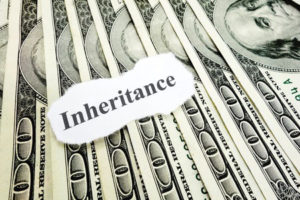As we get closer to the repeal of the New Jersey Estate Tax on January 1, 2018, it is important to remember that New Jersey has NOT gotten rid of its inheritance tax. Accordingly, if you wish to leave money to brothers, sisters, nieces, nephews, friends or a significant other (besides a spouse) and if you have life insurance, you should explore whether a trust is a good option.
Here’s generally how the NJ Inheritance Tax works. There is no inheritance tax on money going to charities or Class A Beneficiaries. Class A Beneficiaries include:
- A spouse (or civil union partner or a registered domestic partner);
- Lineal ascendants (parents, grandparents, etc.);
- Lineal descendants (children, grandchildren, great-grandchildren, etc.) and
- Step-children (but not step-grandchildren)
New Jersey excludes a number of items from the inheritance tax. Specifically, the major items are excluded from the NJ Inheritance Tax are:
- Real estate or real property owned outside of NJ (Note that if you own a co-op, you technically do not own real estate, you own stock, which is intangible asset that is subject to the NJ inheritance tax.);
- Money recovered under the NJ Death Act (as compensation for wrongful death); and
- Life insurance that is payable to anyone except to a person’s estate.
As you can see, when it comes to life insurance, if you ultimately want money going to brothers, sisters, nieces, nephews, friends or a significant other, you don’t want to name your estate as the beneficiary (even if it filters through a Will) because it results in a NJ inheritance tax.
Now, the easy and obvious solution in most cases is that you can simply fill out a beneficiary designation form for the life insurance policy and name the people that you want, and then the death payout will be excluded from the NJ Inheritance Tax. However, many people want to create more complex arrangements. Here are some situations in which it is likely worth the time and expense to set up a trust:
- If you want to set money aside for the benefit of an elderly parent or special needs relative, but upon their death, want the balance to go to other people.
- If you want to have a complex formula for who gets your assets. (For example: If Person A and B are alive, they get 30% each and person C gets 40%, but if A or B is not alive, then person C gets their share.)
- If you don’t want to let the beneficiary of your policy have immediate access to the money upon your death. Let’s say you want to leave money to a niece or nephew, but they are a minor, so you want them to have money for college, but not play money until later in life. A trust is especially good here if you don’t trust your sibling to manage the money.
- If you have multiple policies and many beneficiaries, you may not want to update all the policies every time you change your mind regarding who the beneficiaries should be. If you name the trust as beneficiary, you can just change the trust and you won’t need to redo beneficiary designation forms at multiple institutions.
- If you want to name certain people as beneficiaries, but you don’t want them to know. (Keep in mind that some insurance companies ask for Social Security Numbers of the beneficiaries and you may not want to ask people for that, or they may want to know why. With a trust, you don’t even need to have that conversation.)
- In divorce settings. Let’s say you are obligated to pay life insurance to a ex-spouse, for a certain period of time, or based upon a formula. You can name the trust as the beneficiary, and put the formula in the trust. The alternative is revising your policy each year.
Remember, in many of the scenarios above, you can simply create a Will that sets up a trust, but if you name the estate as the beneficiary, it causes the inheritance tax. If you set up the trust before you die, and name the trust, it won’t cause an inheritance tax. It is also very important to realize that if you are only worried about avoiding the NJ inheritance tax, it does NOT have to be a traditional irrevocable life insurance trust. This means that if you even have a traditional revocable trust and name that as the beneficiary of your policy, it avoids the NJ inheritance tax.




